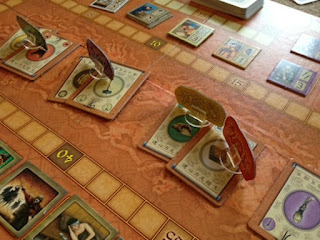A great game that I got to learn at a friend's house is In the Year Of The Dragon (or "the game where all of your people die, but you might win anyway.")
In the Year of the Dragon is played over a series of 12 rounds (months). In each round, you get to perform an action, recruit a new person, and then an event occurs. There are seven different actions, and most of these actions correspond with a person/role. You are allowed to perform any of the actions, and if you have corresponding people in your empire, then you get a bonus for that action. But, the actions are placed in groups - and if you select an action in a group that has already been selected, you have to pay a penalty. Some of the actions include building more buildings, collecting taxes, harvesting rice, creating fireworks, and collecting victory points. After everyone performs an action, each player selects a card from their "people deck", and gains the corresponding person into his empire. Each "people deck" consists of one copy of each of the different types of people, along with two wild cards, and you will use each of these cards at some point during the game. Finally, an event occurs (this is where the death happens). Events can include having to pay a tribute, fight off Monguls, deal with a drought, or deal with the plague. After the event, everyone scores victory points for the round - with points being gained by court ladies, buildings, and dragon scrolls. At the end of the game, players also score points for the number of (living) people they have, and a few other things. And, whoever has the most points wins!
 |
| Jockeying for position |
The next thing that I like about In the Year of the Dragon is that you really feel like you need to do everything, but you simply can't. The events really help with this feeling. You need rice to feed your people. But you also need money to pay the tribute. And you need doctors. Should you spend money on performing the rice action that someone has already selected, when you might need that money later on for paying tribute? Which person should you select? If you select the farmer, then you can get the rice you need more quickly, but if you don't select the older healer right now, there might not be any left by the next time you get to recruit a new person - which means that you're going to lose people to the plague. And, what if the plague events are not anywhere near each other. Are you going to hang onto the young healer when you lose someone to the drought, or are you going to keep him so that you don't lose anyone in the next plague? The game creates a fabulous balance of needing to do a lot of different things at the same time. Yet, everyone else is in the same quandary, which is what keeps the game exciting.
 |
| Death is coming... |
The final pro that I will mention for In the Year of the Dragon is that I really like the "people deck." (Again, just making up names here, folks. I'm not creative with these things, which is why I don't write short stories.) I like that each player is forced to recruit every role, but also has the freedom to recruit some roles several times, using the wild card. This element makes you decide how to best fit each role into your strategy, while still giving you flexibility to implement the strategy of your choice. After all, some of the roles might serve the single purpose of moving you further along the people track, and then being immediately killed in a plague. But, I enjoy making these meaningful decisions.
I really enjoy In the Year of the Dragon, and am struggling a bit to come up with legitimate cons for the game. However, the one thing that I will mention is that dragon scrolls, when purchased early in the game, may be a bit too powerful. One of the actions allows you to purchase dragon scrolls. There are two sizes - large and small (again with the creativity). Large dragon scrolls give you two points, whereas small dragons scrolls give you one point. But, you get these points at the end of every turn! So, if you purchase a large dragon scroll on your first turn (which you have enough money to do), then you just earned 24 points. *Poof!* Sure, this will cost you all of your money and on your first few turns you will be a bit crippled, but it's still 24 points in a game where one hundred points is a gigantic score.
Overall, I give In the Year of the Dragon a 9.0/10. I really enjoy this game, and I intend to keep it in my game closet for years to come.
If In the Year of the Dragon sounds interesting, you might also check out Caylus, Princes of Florence, and Stone Age.

No comments:
Post a Comment